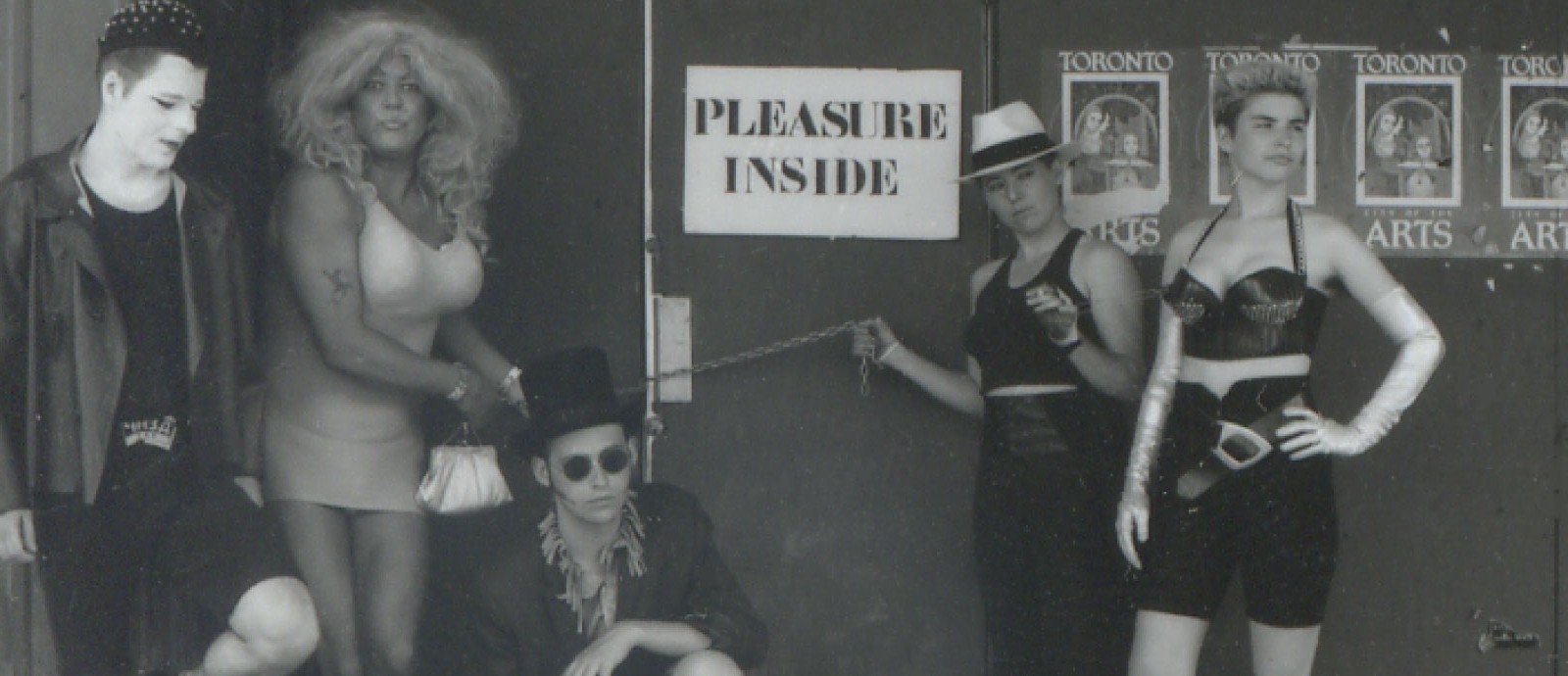
Our History
LEARN EVEN MORE: Our Building // The Rhubarb Archive // In the Press // Past Productions
Founded in 1979 by Sky Gilbert, Matt Walsh, and Jerry Ciccoritti, Buddies in Bad Times Theatre humbly began with a production of Gilbert’s Angels in Underwear staged in an old brewery on Queen Street East. The name was taken from Eric Bentley’s translation of a Jacques Prévert poem. Since then, the company has grown to be the largest and longest-running queer theatre company in the world – a unique institution that has made an unparalleled contribution to the acceptance of queer lives in Canada, while nurturing some of the country’s most innovative artists, including Atom Egoyan, Ann Marie MacDonald, Sonny Mills, Daniel Brooks, Nina Arsenault, Tawiah M’carthy, Waawaate Fobister, and Daniel MacIvor.
Although the company eventually achieved notoriety and success in the 1980’s as a queer theatre company, it was not founded with that intent. Buddies’ original focus was on staged adaptations of poetry. However, during the 1980’s, under the sole leadership of Sky Gilbert, Buddies developed a distinctly queer aesthetic and practice. The company articulated a vision for its work that was unapologetically political, fiercely pro-sexual, and fundamentally anti-establishment. In 1983, Sue Golding joined the company as its founding Board President – a post which she held until 1995 – and played an instrumental role in shaping the direction of the organization. Some of the company’s earliest commercial and critical successes included productions of Gilbert’s Lana Turner has Collapsed! (1980), The Dressing Gown (1984), Drag Queens on Trial (1985), and The Postman Rings Once (1987), Don Druick’s Where is Kabuki? (1989), as well as the Sex Tours of the Church-Wellesley community hosted by Gilbert’s drag persona Jane.
After spending over a decade as a nomadic company, Buddies moved into its first home at 142 George Street in 1991. This building housed iconic productions of Gilbert’s Suzie Goo: Private Secretary (1991) and Play Murder (1993), Daniel MacIvor’s 2-2 Tango (1991) and was also the site for the infamous Dungeon Parties, which experimented with S/M performance and demonstrations. Under the always provocative cross-dressing Gilbert, Buddies in Bad Times courted controversy and offended many. “Buddies is not about assimilation and never has been about glossing over the differences between gays and straights,” Gilbert said in a 1989 interview. “We are interested in life on the edge, the avant-garde, forbidden territory.”
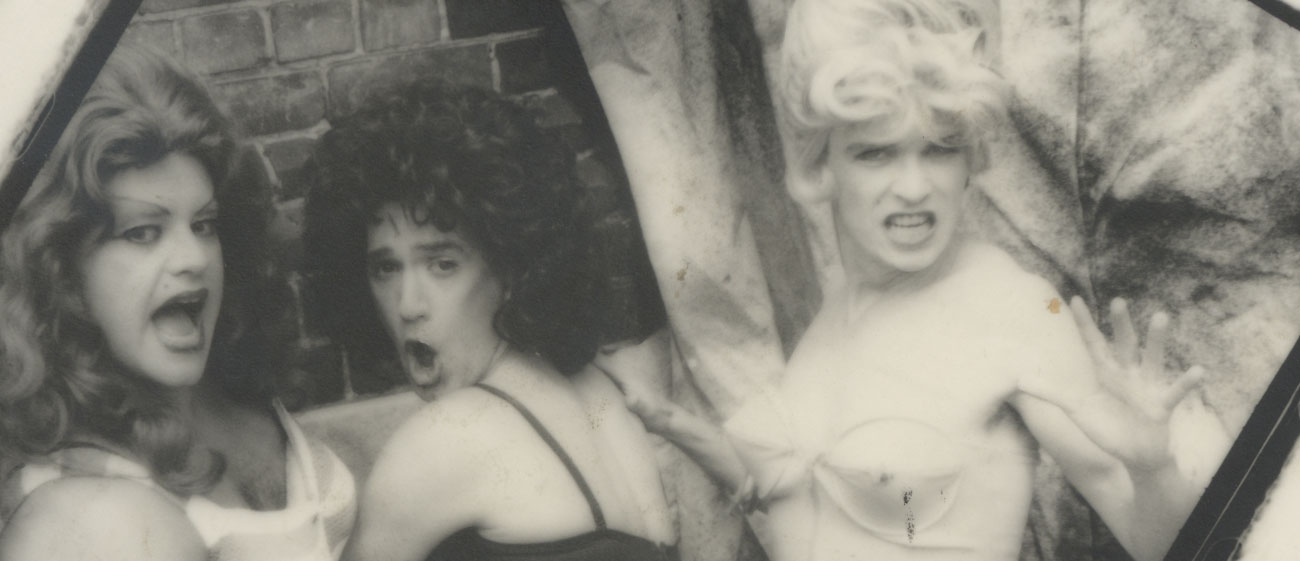
In 1994, Buddies moved into its current home at 12 Alexander Street, in the heart of Toronto’s gay village. In contrast to the space on George Street (a former car wash with minimal renovations), 12 Alexander offered many new opportunities for a growing company like Buddies including two stages (a cabaret space and a flexible black box), technical equipment, office space, and many other theatrical amenities installed by the building’s previous tenants, Toronto Workshop Productions.
Later that year, Buddies met with harsh criticism from The Toronto Sun – led by columnist Christine Blizzard – who attempted to have the company’s city funding rescinded. Sky Gilbert, dressed as Jane, led a protest march that ended at the Sun’s headquarters, and with overwhelming community organization and support, the company’s funding remained intact.
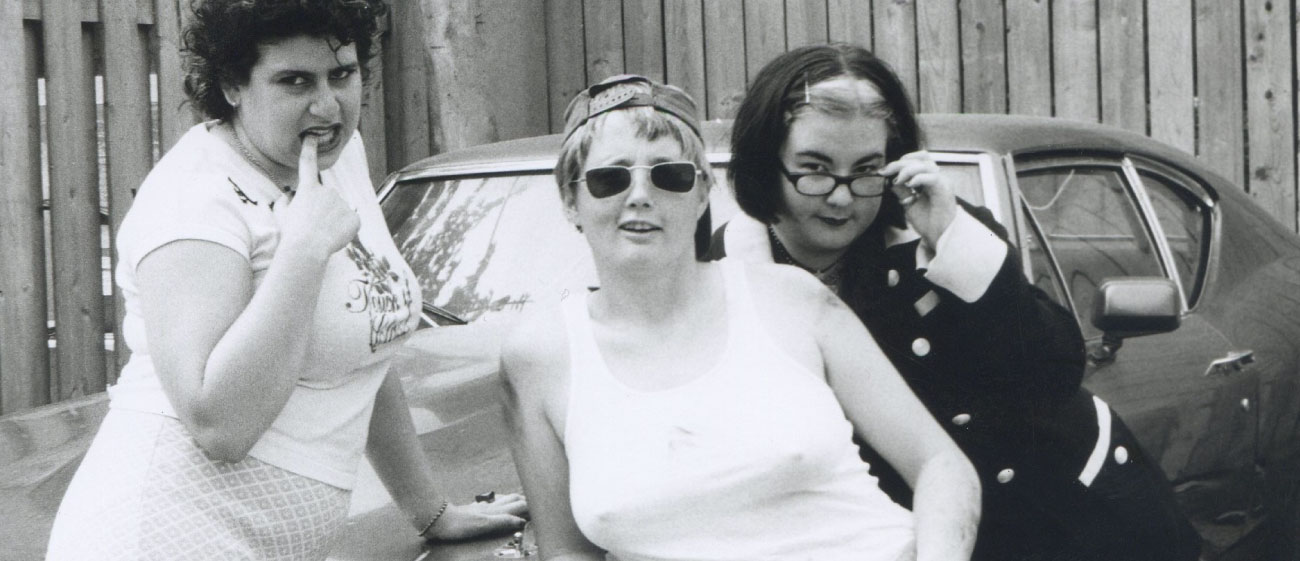
Sky Gilbert stepped down from his role as Artistic Director in 1997, leading to the appointment of Sarah Garton Stanley, who ran the company until 1999. Stanley’s time at the company saw many successes, including seminal productions of Brad Fraser’s Martin Yesterday (1998) and Robin Fulford’s Steel Kiss and Gulag (1998/99) and a playwright development partnership with the Shaw Festival. In her time with the company, she helped stabilize the financial and artistic future of the company. Stanley co-created the Ante-Chamber Series with Edward Roy and worked to revision the Rhubarb Festival with Franco Boni. She also helped support the Summer ’99 Project, an interdisciplinary theatre/visual art community art project for queer youth under 25, carried out in partnership with SOY and Arts Starts Neighbourhood Cultural Centre.
In 1999, Stanley was succeeded by David Oiye whose tenure was marked by a dedication to queer youth and an expanded notion of theatre that included queer experiments in cabaret, burlesque, performance art, and music. The company’s successful weekend club nights in Tallulah’s Cabaret grew into a stage for queer artists such as Sasha Van Bon Bon, Kitty Neptune, R. Kelly Clipperton, Pretty Porky and Pissed Off, Keith Cole, Will Munro, and Kids on TV.
Under Oiye’s leadership, the company staged seminal productions of Waawaate Fobister’s Agokwe (2008), Salvatore Antonio’s In Gabriel’s Kitchen (2006), Daniel MacIvor’s solo trilogy House, Here Lies Henry, and Monster (2006/07), and Oiye’s own Arthouse Cabaret (2007). In 2009-10, Buddies committed its entire season to work by women creators in response to a scathing report on the lack of gender equity in Canadian theatres from the Canada Council for the Arts.
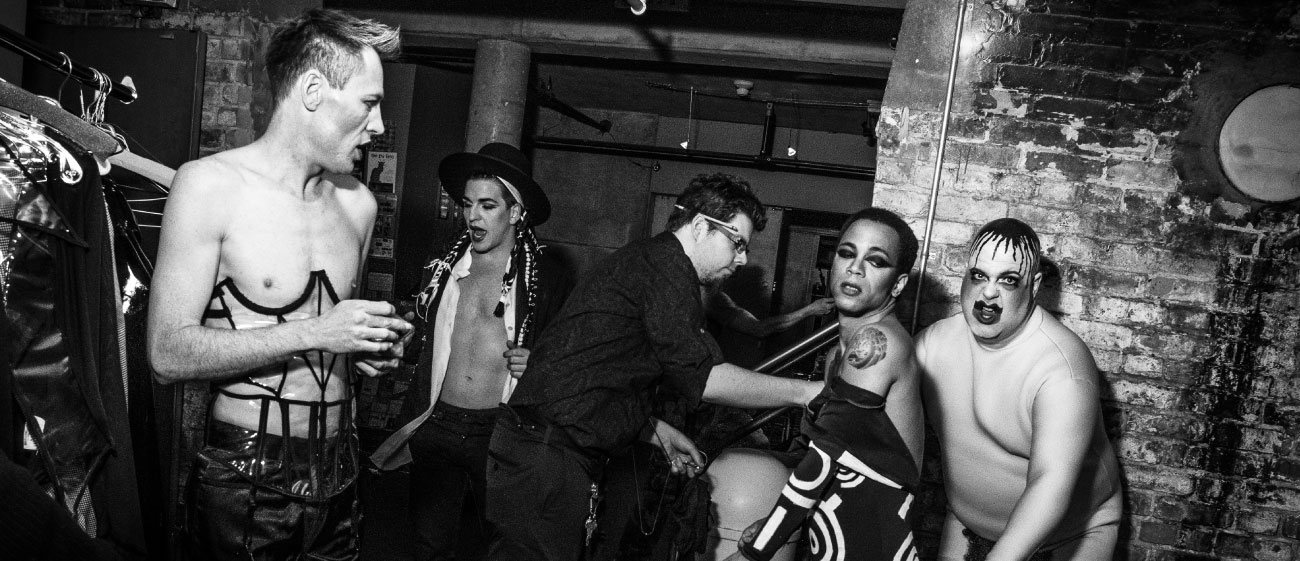
In 2009, Brendan Healy became the company’s fourth artistic director. Under Healy’s direction, Buddies achieved new heights of commercial and critical success with productions such as Nina Arsenault’s The Silicone Diaries (2009), Sarah Kane’s Blasted (2010), Jean Genet’s The Maids (2011), Daniel MacIvor’s Arigato, Tokyo (2013), and Michel Marc Bouchard’s Tom at the Farm (2015) and presentations of leading international queer artists such as Split Britches, Justin Vivian Bond, Heather Cassils, and 2boys.tv. Healy has also brought the queer culture fostered at Buddies to cities across the country with new touring initiatives that have travelled from Montreal to Vancouver, including stops at The National Arts Centre and the Magnetic North Theatre Festival. During this time, The Rhubarb Festival also enjoyed unprecedented success and shattered audience records under Festival Directors Laura Nanni (2010-2014), Mel Hague (2015 – 2019). Under Healy’s leadership, the company received over 35 Dora Award nominations and more than once took home the award for Outstanding Production.
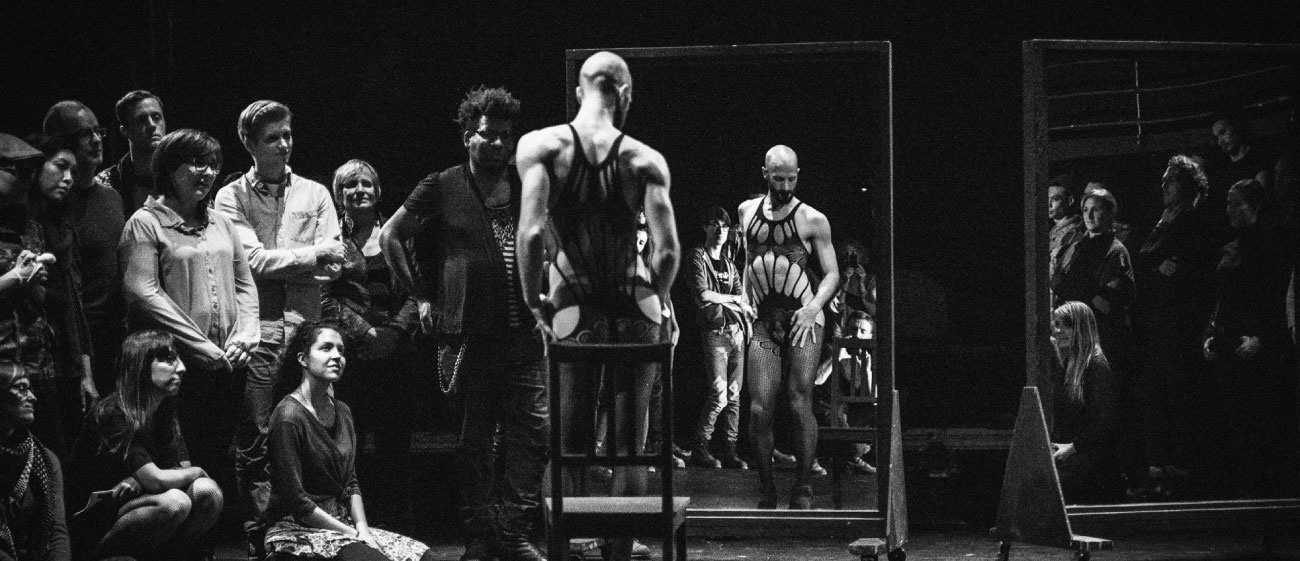
In 2015, Evalyn Parry was announced as the company’s fifth Artistic Director. During her tenure, Buddies programming reached beyond the walls of building to include more community-engaged projects, partnerships with other equity-seeking companies, and the company’s first international tour. The Youth/Elders Project expanded queer youth programming to include intergenerational community, beginning with a year-long, community-engaged project culminating in a mainstage production co-directed by Parry with Vanessa Dunn and Leelee Davis. The annual 2-Spirit Cabaret was established in partnership with Native Earth Performing Arts, and the acclaimed Kiinalik:These Sharp Tools (created by Parry, Laakkuluk Williamson Bathory, Erin Brubacher, Elysha Poirier with Cris Dersksen) became the first Buddies production to tour nationally and internationally. Other significant mainstage productions during this era included Gertrude and Alice (Independent Aunties), Black Boys (Saga Collectif), lemontree’s reimagining of Michel Marc Bouchard’s Lilies and Acha Bacha by Bilal Baig (with Theatre Passe Muraille).
In March 2020, Parry was directing the premiere production of Jenna Harris’ Mine which was days away from opening when COVID-19 shut down the theatre. Parry stepped down in September 2020, and recommended Buddies use the transition time to restructure, and consider new leadership models for the organization’s future.
During the COVID-19 pandemic, Buddies continued to engage with artists and audiences, through digital programs like the Queer, Far, Wherever You Are performance series, Queer Pride Inside (in collaboration with CBC Arts), Taylor Mac’s Holiday Sauce (with TO Live) as well as analogue projects like Pride Pen Pals, and the reimagining of The Rhubarb Festival (under festival director Clayton Lee) as an award-winning performative publication delivered to audiences across the country.
Throughout its history, Buddies has been steadfastly committed to the creation and development of new work by queer artists. The Rhubarb Festival has been a mainstay of Buddies programming since its inception in 1979, but the company has also provided a variety of other venues for new work. The 1980’s saw the 4-Play and QueerCulture Festivals as well as the beginning of the lesbian cabaret Strange Sisters. By the 90’s, the company had also established the Ante Chamber Playwright’s Unit and Hysteria: A Festival for Women. Today, Buddies supports new creations through its multi-faceted emerging artist programs, the Buddies Residency Program, Seeding Work, and showcases like the 2-Spirit Cabaret and a curated QueerCab series.
Buddies enters its 44th season as the premier cultural centre for Toronto’s queer community, as the top destination for all audiences seeking cutting-edge theatre in Toronto, as a leading centre for the creation and presentation of alternative theatre in Canada, and as a preferred employer in the arts in Toronto.
with research and contributions by Evan Vipond
images (from top)
promotional image from outside our old home on George Street
Drag Queens on Trial – Sky Gilbert, Ken McDougall, and Gordon MacKeracher
Strange Sisters – Ruby Rowan, Jane Farrow, and Mariko Tamaki
Of a Monstrous Child: a gaga musical – Gavin Crawford, Kyle Travis Young, Chy Ryan Spain, and Bruce Dow
The Principle of Pleasure – Gerrard Reyes
